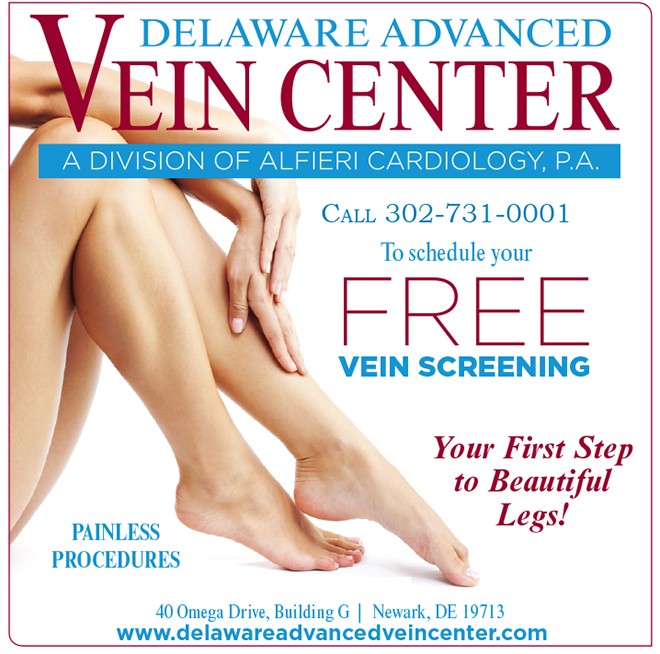Understanding Varicose Veins

By Anthony Alfieri, DO, FACC
Varicose veins are not just a cosmetic concern. They can lead to discoloration, bleeding, ulcers, and a “heavy leg” sensation that may hinder daily activity. Varicose Veins occur when your vein isn’t functioning properly. Veins have one-way valves that prevent blood from flowing backwards. When the veins valves fail, blood begins to collect in the vein rather than continuing to the heart. It is important to talk to your doctor if you are experiencing any of these symptoms.
Who is at risk for varicose veins?
Most people believe that varicose veins are just cosmetic and inflict women more than men. However, there are many factors that can lead to the painful varicose veins. Below are some of those indicators:
FAMILY HISTORY: If varicose veins run in your family, you may have up to a 50% chance of having them yourself. Just because they run in your family, does not necessarily mean you are destined to be afflicted. There are other factors that can cause them.
AGE: As you get older, the valves may start wearing out over time. Even if you take care of yourself, you still may get varicose veins.
GENDER: Varicose veins do impact women more due to the hormonal changes in their body during their lifetime.
OBESITY: Body Mass Index (BMI) is a weight to height ratio. There are many BMI calculators available. Being overweight (BMI between 25.0 and 29.9) and especially obese (BMI > 30.0) can cause varicose veins due to the added pressure in the vein system of your legs.
INACTIVTY: Sitting more during the day or crossing your legs may make your veins work harder to pump the blood up to the heart. This may prematurely wear out the valves.
Other risk factors may include smoking, taking birth control pills or a hormone replacement therapy and leg injury.
Is there prevention for varicose veins?
If you already have varicose veins, prevention can only help the varicose veins from getting worse, but it will not make them go away. Here are some things you can do to help your legs.
GET ACTIVE: Moving around during the day instead of sitting can help your legs. It is recommended that if you have a desk job, you should move for 2 minutes for every 20 minutes. Being athletic does not mean you can’t get varicose veins. There are other factors involved if you are at risk to get them.
ELEVATE LEGS: To help with circulation, try elevating your legs to assist the veins to get the blood to your heart.
LOSE WEIGHT: Losing weight can prevent the varicose veins from getting worse as well as many other chronic conditions, including cardiovascular disease, diabetes, gout and some cancers to name a few.
TREATMENT: At the Delaware Advanced Vein Center, Dr. Alfieri uses radiofrequency to treat the vein. A thin catheter is inserted into the vein under local anesthetic. The slender catheter delivers radiofrequency (RF) energy to the catheter, which heats the vein wall. As the vein wall is heated and the catheter is withdrawn, the collagen in the wall shrinks and the vein closes. Once the diseased vein is closed, blood is re-routed to other healthy veins.
If you are experiencing pain, swelling or other symptoms of varicose veins, call today at (302) 690-0933 to schedule a free vein screening. We can walk you through the process and get you on your way to healthier legs!
Anthony Alfieri, DO, FACC is a board certified interventional cardiologist, who has been practicing in the New Castle County area for over 25 years. His efforts to improve the quality of life for all individuals – both men and women alike – who suffer from the effects of venous insufficiencies continues with the formation of Delaware Advanced Vein Center. Dr. Alfieri has found that for many people, having varicose veins is needlessly limiting and it is a common misconception that the treatment of varicose veins is painful and not worth the effort. So as to provide better care for his patients, Dr. Alfieri is now performing radiofrequency ablations.
Intersocietal Commission for the Accreditation of Vascular Laboratories:
The purpose of ICAVL is to ensure high quality patient care and to promote health care by providing a mechanism to encourage and recognize the provision of quality noninvasive vascular diagnostic testing by a process of voluntary accreditation.
Intersocietal Commission for the Accreditation of Nuclear Medicine Laboratories:
The purpose of ICANL is to ensure high quality patient care and to promote health care by providing a mechanism to encourage and recognize the provision of quality nuclear cardiology and nuclear medicine diagnostic evaluations by a process of voluntary accreditation.
Intersocietal Commission for the Accreditation of Echocardiography Laboratories:
The purpose of ICAEL is to ensure high quality patient care and to promote health care by providing a mechanism to encourage and recognize the provision of quality echocardiographic diagnostic evaluations by a process of voluntary accreditation.
Headshot by Shannon Adelson of Adelson Media, Inc.


